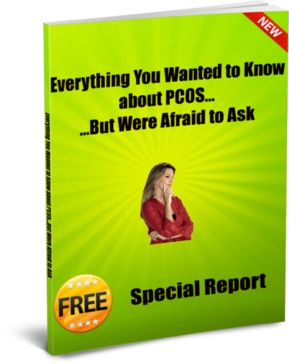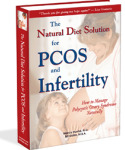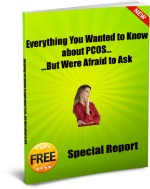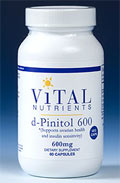PCOS Review Newsletter #151
1) Could Soy Be Causing You Problems?
2) Is Soy Formula a Problem for Your Baby?
3) Dr. Morita Adds Meaning to My Life
1) Could Soy Be Causing You Problems?
Foods made from soybeans are everywhere, especially in processed foods. I wouldn't be surprised if you're consuming more soy than you think. Vegetarians in particular seem inclined to consume soy-based foods, possibly as a substitute for animal protein.
Soy-based foods are believed by many of us to be an inexpensive and healthy food source. In fact, you can walk into most health food stores or supermarkets and find soy protein powder being marketed as a health food.
So where's the problem?
As with many things, soy is a complex food that represents both benefits and potential risks. A primary benefit appears to be lowered cardiovascular risk. But what of the risks?
I've shared in previous newsletters that almost all the soy we consume is genetically modified, and that genetically modified soy has created infertility problems in lab animals.
In "The Natural Diet Solution for PCOS and Infertility" e-book, I devoted a chapter to the pros and cons of soy. (See chapter 4.4). One of the issues discussed in the e-book was the negative effect of soy on your thyroid function.
I just came across a recent study from Michael White Diabetes Centre in the UK. They studied 8 males and 52 females who had borderline hypothyroidism. They were given soy protein containing different amounts of "phyto-estrogens", which are plant materials that have mild estrogenic activity in your body.
The researchers concluded, "In summary, soy phytoestrogen supplementation at a level reflecting that found in a vegetarian diet appeared to precipitate overt hypothyroidism, especially in female patients with subclinical hypothyroidism. This suggests that female vegetarian patients with subclinical hypothyroidism may need more careful monitoring."
In other words, too much soy could impair your thyroid function, resulting in insufficient production of thyroid hormones.
Hypothyroidism (low thyroid function) is problem for women with PCOS. For starters, it makes it difficult to become pregnant, increases risk of pregnancy complications, make it very difficult to lose weight, and makes you feel lethargic.
If you eat a lot of processed foods containing soy, take soy protein powder, or are a vegetarian, it's recommended that you have your doctor closely monitor your thyroid gland function. You may find it difficult to make all of your PCOS problems go away if your thyroid isn't working properly.
Source:
Sathyapalan T et al, The Effect of Soy Phytoestrogen Supplementation on Thyroid Status and Cardiovascular Risk Markers in Patients with Subclinical Hypothyroidism: A Randomized, Double-Blind, Crossover Study, J Clin Endocrinol Metab, 2011 Feb 16; [Epub ahead of print].
2) Is a Soy Formula a Problem for Your Baby?
Since we're on the topic of soy, would a soy formula be OK your baby? Sometimes women resort to soy formula because cow's milk formulas can call allergy problems in infants.
We all know that breast feeding is best for your baby, but what if you can't breast feed?
I don't have the expertise to tell you what brand of feeding formula to use in lieu of breast feeding. You'll need to consult with a pediatrician or licensed naturopathic doctor for that.
But I did come across several interesting studies on soy formulas that raise caution flags.
The first is one from the University of Arkansas for Medical Sciences. They did ultrasound on 4-month old infants that had been fed either soy, cow's milk, or breast milk. In contrast to those fed cow's milk or mother's milk, the soy-fed female babies had larger ovaries and a higher number of ovarian cysts. Could the phytoestrogens in soy be affecting the ovaries of these infants?
The researchers also released a related study, this time comparing speech perception abilities of infants a 3 months and 6 months. The language processing abilities of the infants was subtly different, depending on whether they were fed soy, cow's milk, or mother's milk. It's conceivable that the type of formula fed to infants might alter brain function in some way.
The third interesting study was from the University of Toronto. They fed newly born mice soy components similar to what a human infant would receive. When the baby female mice grew up, they were much less fertile than ordinary mice. However, the next generation of mice had normal fertility. In addition, the soy-fed mice were heavier than mice not fed the soy. And surprisingly, this increased weight carried on to the next generation.
Other studies have shown that soy formula can cause thyroid enlargement (goiter) in infants.
The research evidence is suggesting that we need to be very discerning about what we feed our babies, especially if the mother has PCOS. What they are fed will affect how they develop.
Sources:
Gilchrist JM et al, Ultrasonographic patterns of reproductive organs in infants fed soy formula: comparisons to infants fed breast milk and milk formula. J Pediatr. 2010 Feb;156(2):215-20.
Brain Lang. 2012 Jan;120(1):27-41. Epub 2011 Sep 1.
Pivik RT et al, Effects of diet on early stage cortical perception and discrimination of syllables differing in voice-onset time: A longitudinal ERP study in 3 and 6month old infants. Brain Lang. 2012 Jan;120(1):27-41
Dinsdale EC et al, Early life exposure to isoflavones adversely affects reproductive health in first but not second generation female CD-1 mice. J Nutr. 2011 Nov;141(11):1996-2002.
Bar-El DS et al, Soy as an endocrine disruptor: cause for caution? Isr Med Assoc J. 2010 Nov;12(11):684-6.
3) Dr. Morita Adds Meaning to My Life
As you well know, PCOS can be an emotional roller coaster at times. The same could also be said about life in general, beyond the issues that PCOS presents.
It's always wise to seek out help if you feel you need it for improving your life.
An important source of help for me is Dr Shoma Morita, a Japanese psychologist (1874-1938). His psychological concepts were widely viewed as revolutionary.
In a nutshell, Dr. Morita's philosophy is to always keep these things in mind:
- Know your purpose.
- Accept your feelings.
- Do what needs to be done.
Dr. David Reynolds, a Morita therapist, does a good job of describing Morita therapy in his book "Playing Ball on Running Water" (which may be out of print). In case you can't find the book, below are some of my notes from it.
Accept your feelings as they are (rather than using energy and attention trying to analyze them) and get right to work on attention and behavior.
Pay close attention to what you are doing right now.
The doing is what is important, not your feelings of the moment or even the anticipated result of what you are doing. You cannot control feelings.
You cannot control the outcome of something. You can only control your behavior right now. So don't try to control the uncontrollable.
The surest way of discovering the limits of your abilities is to act. Acting on reality gets you some response from reality. That response tells you about yourself in the world. You learn your true capabilities, your true limitations, and, invariably, what needs to be done next.
Every act provides the opportunity for purposeful accomplishment and personal growth. Every act can involve moments of directed attention.
Each moment brings possibilities for purposeful activity.
There are no golden hours, only ready people.
Accept your feelings of inadequacy but nevertheless continue with what needs to be done.
Risk and struggle are necessary for life to have meaning.
Those are my notes. If this makes resonates with you, you may wish to investigate Morita therapy further. It could help you to deal with the challenges of PCOS.
"Don't judge each day by the harvest you reap but by the seeds that you plant." -- Robert Louis Stevenson
PCOS Health Review
This free newsletter gives you original and immediately usable information to help you deal with PCOS.
Get the latest research, tips for improving your health, answers to questions, success stories, and more!
Your e-mail address is totally secure. We will never misuse your information.
Enter Your Email Above to Subscribe Today
and Get Your Questions Answered in this Free Special Report!





